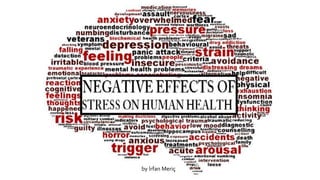NEGATIVITY AND ITS EFFECTS ON HEALTH
NEGATIVITY AND ITS EFFECTS ON HEALTH:
Negative attitudes and feelings of helplessness and hopelessness can create chronic stress, which upsets the body's hormone balance, depletes the brain chemicals required for happiness, and damages the immune system. And causes of Negativity is often a product of depression or insecurity. It can stem from illness, life events, personality problems, and substance abuse. Like many things in life, negativity too, can become a habit. Frequent criticism, cynical thoughts, and denial can create neural pathways in the brain that encourage sadness. These negative tendencies can cause our brain to distort the truth and make it even more difficult to break the negative cycle. Luckily, most habits can be broken. Experts say that it takes 21 days to break a habit.
What are the Types of Negativity on human health?
1) Cynicism: A general distrust of people and their motives.
2) Hostility: Unfriendliness towards others; unwilling to develop relationships.
3) Filtering: Only noticing the bad in what should be a happy experience or memory.
4) Polarized Thinking: The belief that if something or someone is not perfect, then they must be horrible.
5) Jumping to Conclusions: Assuming something bad will happen because of circumstances in the present.
6) Catastrophizing: The belief that disaster is inevitable.
7) Blaming: Blaming others for personal maladies, and feeling that you are a victim to life’s uncontrollable events.
8) Emotional Reasoning: Using your emotions to define what is real and what is not.
9) Fallacy of Change: The thinking that if people or circumstances change, you can then be happy.
10) Heaven’s Reward Fallacy: Type of negativity that assumes there will always be a reward for hard work and sacrifice. When the reward does not come, you become bitter and depressed.
Some of the common effects of negativity include:
- Headache
- Chest pain
- Fatigue
- Upset stomach
- Sleep problems
- Anxiety
- Depression
- Social withdrawal
- Drastic changes in metabolism (i.e. overeating or under-eating)
How Do Thoughts and Emotions Effects Health Negatively?
Your thoughts and emotions can affect your health. Emotions that are freely experienced and expressed without judgment or attachment tend to flow fluidly without impacting our health. On the other hand, repressed emotions (especially fearful or negative ones) can zap mental energy, negatively affect the body, and lead to health problems are the same way that negative thoughts create neural pathways in the brain, positive self-talk and reinforcement can also become a habit. Research suggests that happiness and optimism are more of a choice than influenced by circumstance. Here are some tips to overcome negativity.
your body responce the way you feel, and act. This is one type of “mind/body connection.” When you are stressed, anxious, or upset, your body reacts physically. For example, you might develop high blood pressure or a stomach ulcer after a particularly stressful event, such as the death of a loved one. Many things that happen in your life can disrupt your emotional health. These can lead to strong feelings of sadness, stress, or anxiety. Even good or wanted changes can be as stressful as unwanted changes. These things include.
If feelings of stress, sadness, or anxiety are causing physical problems, keeping these feelings inside can make you feel worse. It’s okay to let your loved ones know when something is bothering you. However, keep in mind that your family and friends may not always be able to help you deal with your feelings appropriately. At these times, ask someone outside the situation for help. Try asking your family doctor, a counselor, or a religious advisor for advice and support to help you improve your emotional health.
-------BUKKE RAJESHNAIK
===================THE END=============================





Super content Broo...Very informative ❤️
ReplyDelete